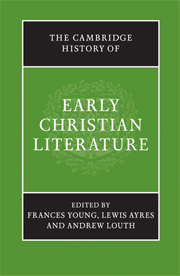Book contents
- Frontmatter
- PART ONE The Beginnings: The New Testament to Irenaeus
- PART TWO THE THIRD CENTURY
- A LITERARY GUIDE
- B CONTEXT AND INTERPRETATION
- 17 Social and historical setting: Christianity as culture critique
- 18 Articulating identity
- 19 Christian teaching
- 20 The significance of third-century Christian literature
- PART THREE FOUNDATION OF A NEW CULTURE: FROM DIOCLETIAN TO CYRIL
- Bibliographies
- Index
- Map: The Roman Empire in the late fourth century AD"
- References
18 - Articulating identity
from B - CONTEXT AND INTERPRETATION
Published online by Cambridge University Press: 28 March 2008
- Frontmatter
- PART ONE The Beginnings: The New Testament to Irenaeus
- PART TWO THE THIRD CENTURY
- A LITERARY GUIDE
- B CONTEXT AND INTERPRETATION
- 17 Social and historical setting: Christianity as culture critique
- 18 Articulating identity
- 19 Christian teaching
- 20 The significance of third-century Christian literature
- PART THREE FOUNDATION OF A NEW CULTURE: FROM DIOCLETIAN TO CYRIL
- Bibliographies
- Index
- Map: The Roman Empire in the late fourth century AD"
- References
Summary
The attempt to articulate the boundaries of Christian identity in the third century involved inner-Church debates between groups which held different views on what constituted Christianity. Some of the concerns overlapped with those of the second century. The problem of what to appropriate and what to reject in contemporary culture, for example, was a perennial concern.
The major inner-Church conflicts of the third century, however, concerned the definition and understanding of faith and discipline. These were the two primary boundary markers of Christian identity. What must a Christian believe, and how must he or she live? The main tenets of Christian faith had, by this time, been summarized in what was known as the rule of faith. This was not yet a normalized and fixed document, but there was a body of generally recognized doctrine that could be referred to by this term. Not everyone agreed, however, on how the contents of the rule should be understood. Scripture, of course, was important to all the groups concerned with Christian identity in the third century, but there were different ways of reading Scripture, and these different ways of reading produced different results. Each group in conflict, as we will see, called upon Scripture to support its views.
Keywords
- Type
- Chapter
- Information
- The Cambridge History of Early Christian Literature , pp. 200 - 221Publisher: Cambridge University PressPrint publication year: 2004
References
- 3
- Cited by

